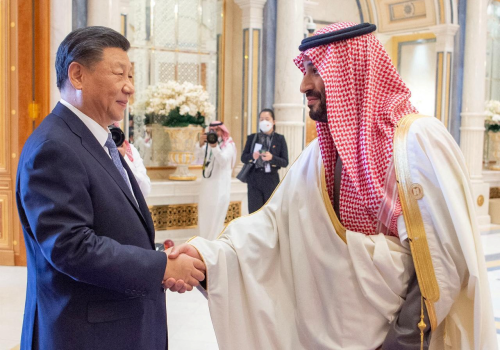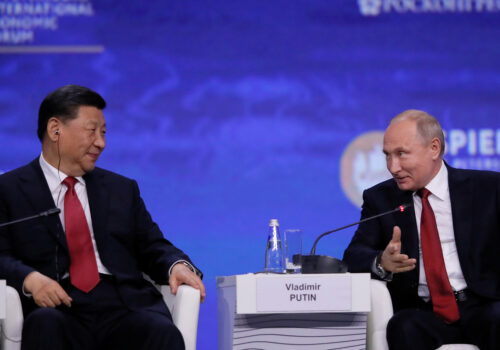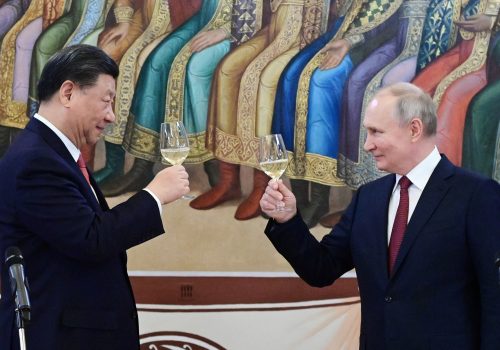China’s bid for a new Middle East meets reality
The year 2023 was supposed to be China’s big break in the Middle East.
It began in March, when China brokered a historic détente between regional rivals Iran and Saudi Arabia, sidelining the United States. The image of China’s top diplomat Wang Yi beaming with Saudi and Iranian ministers in Beijing prompted swift comparison by Chinese propagandists to the Oslo Accords.
In the months that followed the agreement, it seemed as if everyone was talking to everyone in the region. Qatar ended its isolation. Turkey reconciled with Gulf states and Egypt. No longer a pariah, Syria rejoined the Arab League.
In August 2023, Wang declared that a “wave of reconciliation” was sweeping the Middle East, attributing the developments to China’s influence, even where there was little to be found. A narrative began to emerge that the “Beijing Consensus” was proving itself to be a superior alternative to the longstanding US-led system of global order.
But the October 7 Hamas terror attack on Israel has put China’s story to the test. The Israel Defense Forces’ (IDF) fierce response, which aimed to wipe out Hamas and liberate the hostages, came at a high cost. Thousands died and most of Gaza’s 2.3 million residents were displaced. (The author is a reservist in the IDF.)
The loose coalition of terrorist groups in Lebanon, Iraq, Syria, and Yemen that Iran supports under the “axis of resistance” saw the Jewish state at its nadir and jumped on the bandwagon. Hezbollah and the IDF are now engaged in a battle of attrition, with many observers believing that an all-out war is a matter of when, not if.
Meanwhile, Tehran’s Houthi beneficiaries have used the war to shift their guns from the Sunni Gulf to maritime shipping, choking off vital Red Sea arteries and putting a strain on global trade. The formation in December of a US-led naval task force dubbed “Prosperity Guardian” did not deter those with little to lose, as the Houthis launched their largest attack yet on January 9.
Fears of a region-wide “explosion” are growing.
China dithers, the US deters
As with Russian President Vladimir Putin’s illegal invasion of Ukraine, Russia’s “no-limit” partner once again has to straddle between irreconcilable goals that extend far beyond the battlefield: maintaining global peace and stability on one side, pursuing geopolitical interests amid the current conflict among the region’s powers on the other.
Within days of Hamas’s offensive, the Pentagon deployed two aircraft carrier strike groups in what is believed to have prevented Iran and Hezbollah from escalating the war. US forces retaliated against attacks on their bases in Syria and Iraq with calculated, lethal force to stop the conflict from spilling over. Their mission is part of the global campaign to defeat the Islamic State of Iraq and al-Sham (ISIS), in which China was “notably absent,” as it is now.
And as US warships swatted down dozens of missiles and drones from Yemen, Chinese anti-piracy ships ignored an Israeli-affiliated tanker’s multiple distress calls. Even attacks on Chinese-owned ships elicited no response from the People’s Liberation Army Navy.
China is a permanent member of the United Nations (UN) Security Council and a self-styled “responsible major power.” With its newfound role as a “major peace broker” in the Middle East, all eyes are scrutinizing its response—or lack thereof.
Its reputation is not the only thing at stake. During the turmoil in Libya in the last decade, Beijing was forced to evacuate more than 35,000 Chinese workers, and state-owned enterprises lost billions in busted infrastructure projects. A regional conflagration today would jeopardize at least two hundred billion dollars in Chinese foreign direct investment in the Middle East and North Africa, as well as the lives of more than a million Chinese nationals abroad.
So, what options does Beijing have now?
First, it is important to emphasize that Beijing’s “neutrality” in the Middle East was never between Israel and the Palestinians. Wang has stated repeatedly since October 7 that China is on the side of the Arab and Muslim worlds in support of the Palestinians. The question, instead, is how China should strike a balance between Iran, a staunch anti-Western force, and the rich Sunni Gulf, arguably China’s more important economic partner.
Two paths for China
On the one hand, China could choose to throw its support behind the rich Sunni Gulf. However, that would be tantamount to siding with the United States in perpetuating the hegemonic order of “bloc confrontation” that Chinese leader Xi Jinping is attempting to upend. Worse than playing second fiddle, it would entail accepting long-term US tutelage over strategic chokepoints that could be used against China if it blockades Taiwan. Additionally, it would make Chinese assets legitimate targets of Iran and its proxies.
And yet, China’s message of “peace through development” is contradicted by the actions by Iran and its “axis of resistance.” Their actions point to a revisionist Shia regime that affects more than just Israel and deviates from moderate Sunni visions of regional prosperity that Beijing shares.
It wasn’t long ago that Iranian-supplied Houthi drones and cruise missiles crippled half of Saudi oil output and hit an airport in Abu Dhabi, reportedly forcing China to pay an additional $97 million per day to meet its energy needs. The current maritime blockade of the Suez Canal has pinched an important source of revenue for Egypt, where China is the fourth-largest creditor with outstanding debts of nearly eight billion dollars. And with Tehran’s nuclear weapons breakout reportedly just days away, the Middle East may soon have its own version of North Korea.
Chinese analysts see the Middle East and North Africa as a historic “buffer zone.” When US-China relations were at low points following the Tiananmen massacre in 1989 and the Hainan Island Incident in 2001, Beijing was motivated to cooperate when Iraq invaded Kuwait in 1990 and on the “War on Terror” after 9/11, respectively.
One of Hamas’s greatest successes in this war is the radicalization of a new generation of Muslims worldwide. China’s double standards on terrorism may backfire on the country’s religious minorities in Xinjiang, whom it has brutally oppressed for the past decade for this very reason.
The fact that multiple Chinese leaders are in Washington, DC, this week demonstrates that both China and the United States are keen to uphold the “San Francisco vision” established by Xi and US President Joe Biden in November. Cooperation in the Middle East and North Africa region could once again lubricate the process.
On the other hand, China could support the “anti-hegemonic” forces backed by Iran and Russia, which might tie up US troops and resources in the Middle East at the expense of the Indo-Pacific region. In theory, two aircraft carriers in the Red Sea equal two fewer in the South China Sea.
In September 2022, Wang unveiled China’s “new security architecture for the Middle East” as an alternative to US leadership. Although 2023’s “wave of reconciliation” has ebbed, last month, Wang hosted the Saudi and Iranian deputy foreign ministers in Beijing, resuming efforts to establish a new regional order.
In contrast, US-led initiatives to counter China’s regional advances and Iran appear dead in the water. These include the India-Middle East-Europe Economic Corridor, the Abraham Accords, and grouping of India, Israel, the United Arab Emirates, and the United States known as I2U2.
On the global stage, China makes sure that the world knows that, under its leadership, the UN Security Council is strong-arming Israel to agree to a cease-fire, whereas the United States’ vetoes “single-handedly” thwart their efforts. A leaked memo in November 2023 by US diplomats has warned the Biden administration that the longer the war goes on, the more isolated and despised the United States will become, first in the Middle East and then globally.
Beijing only has to sit back and watch.
China’s choice
In effect, China has already made its choice; it has not condemned Hamas’s crimes against humanity, which resulted in the murder of at least four Chinese citizens. Its loquacious diplomats remain silent on Hezbollah’s violations of UN Security Council Resolution 1701, and its naval forces in Djibouti keep to the sidelines while other “major powers with influence” handle the heavy lifting.
It is unlikely that China will join the maritime task force or exert overt pressure on Iran. Yet, if the Houthi attacks net additional losses for Chinese enterprises, Beijing could tacitly support by abstention UN sanctions against the Yemen-based terrorists.
In the meantime, the Chinese Communist Party will likely continue to mobilize its propaganda arm to disseminate disinformation that stokes anti-Western and even antisemitic sentiments.
China’s success is less a strategic masterstroke and more the result of “embracing the global conflagrations that so bedevil Western policymakers,” as Director of the European Council on Foreign Relations Mark Leonard contends. But mistaking Beijing’s opportunistic maneuvering for leadership is a dangerous mirage. The United States’ pivot to the Indo-Pacific region may create space for others to step in, but the region’s challenges demand more than the photo-ops and platitudes that China has to offer.
Recent months have exposed China’s limited commitment to genuine stability in the Middle East while emphasizing the region’s ongoing need for US involvement. The only path to sustainable regional stability is through sustained security engagement against terrorism and radical Islam, bolstered by the economic integration of moderate forces.
The Middle East may at times despise the United States, but it is the best partner the region will find to ensure its prosperity.
Captain (res.) Tuvia Gering is a researcher at the Diane and Guilford Glazer Israel-China Policy Center at the Institute for National Security Studies (INSS) in Tel Aviv and a non-resident scholar at the Atlantic Council’s Global China Hub. Follow him on X @geringtuvia.
Further reading
Wed, Feb 15, 2023
Full throttle in neutral: China’s new security architecture for the Middle East
Issue Brief By Tuvia Gering
This report addresses two widely held beliefs about the nature of China’s engagement in the Middle East and North Africa (MENA) that ought to be revisited in light of notable developments. First, while it is widely assumed that Beijing’s interests in the region are limited to energy security and economic ties, this report will show how cooperation has […]
Thu, Jan 11, 2024
False promises: The authoritarian development models of China and Russia
Report By Joseph Lemoine, Dan Negrea, Patrick Quirk, Lauren Van Metre
Are authoritarian regimes more successful than free countries in offering prosperity to their people? The answer is decidedly no, yet China and Russia advertise the “benefits” and “promise” of their authoritarian development model. This paper showcases why and how the authoritarian development model is inferior to that of free societies.
Thu, Dec 21, 2023
Performative or Substantive Engagement? China & Russia in the Middle East
China-MENA Podcast By
Li-Chen Sim and Mark Katz join us to explore the growing collaboration between China and Russia and its impact on the Middle East, including the amplification of influence through media collaboration as a force multiplier.
Image: Chinese Foreign Minister Wang Yi attends a family photo session with Saudi Foreign Minister Prince Faisal bin Farhan Al Saud, Jordanian Deputy Prime Minister and Foreign Minister Ayman Safadi, Egyptian Foreign Minister Sameh Shoukry, Indonesian Foreign Minister Retno Marsudi, Palestinian Foreign Minister Riyad Al-Maliki and Organisation of Islamic Cooperation (OIC) Secretary-General Hissein Brahim Taha at the Diaoyutai State Guesthouse in Beijing, China November 20, 2023. REUTERS/Florence Lo/Pool


